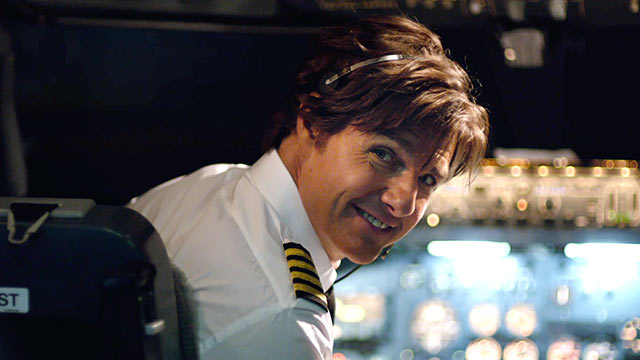Guns, drugs, money, proxy wars, and the American Dream
Set against the backdrop of the Iran-Contra Affair in the ‘70s and ‘80s, “American Made” follows the story of the late, real-life pilot Barry Seal (Tom Cruise). After graduating from the air force academy, the gifted Seal makes a living as a pilot in the Trans World Airlines fleet. Yet, even with swoon-worthy uniforms and a generous salary to support his family, the life of a commercial pilot does not satisfy Seal’s need for excitement in his life. Starved of adrenaline, he even goes as far as creating fake “turbulence” during a flight just to get a good laugh.
One day, a CIA agent, Monty Schafer (Domhall Gleeson), contacts him and asks him to perform undercover photographing missions for the CIA, flying over South America in a small plane equipped with powerful cameras. Mission follows mission for Seal; he is soon dispatched to act as a gun and money courier for a Panamanian general. Things get even more out of hand when Seals gets recruited as a transporter by Pablo Escobar and the rising Medellin Cartel, who are struggling to smuggle their products from Colombia to the States. In the course of the film, one would clearly see Seal’s transition from stable, run-of-the-mill commercial pilot to CIA spy and cartel courier through a series of episodic events expertly performed by Tom Cruise.

Directors Doug Liman and writer Gary Spinelli have crafted a witty and satirical black comedy, turning a twisted government scandal into a funny, entertaining action movie. The bold, bright colors – featuring an abundance of yellow, red, and pink – of each frame set the tone of the film’s comic-book reportage. Liman uses the videotapes that Seal left behind to create a Deadpool-esque narrative, constantly breaking the fourth wall and using the commentary to drive the story forward. This method of displaying narration is not unseen, but it effectively tells the historical context as well as the fiction in an engaging manner. On top of that, the many airplane scenes were actually shot in air with Cruise in the cockpit, who almost always performs his own stunts, making the directing even more natural.
Donning bell bottoms and aviator glasses, Barry Seal’s charming persona oddly makes him a likable anti-hero. As he is thrown into a world of drug-dealing, arms-carrying, and spying, this once ordinary pilot takes on missions one after the other for two simple reasons: excitement and money. Reminiscent of “American Hustle,” a film with similar themes of wealth and the American dream, American Made brilliantly narrates the ludicrous events of politics and covert operations in the 1980s, with Seal at the center of it all.

Throughout the film, Liman makes sure to make you laugh. In fact, you are supposed to laugh at the crescendo of absurdity in Barry’s life, from his recorded tapes to his criminal shenanigans. One such episode is when Seal is forced to land his plane into a suburban garden, emerging from his vehicle covered from head to toe in cocaine and proceeds to steal a little kid’s bike (classic) to ride home. Liman expertly constructs a smooth sequence of frames, transitioning from an airplane speeding in the sky to its rocky landing to a ragged-looking Seal pedaling slowly on a tricycle; the scene’s cleverness lies in the unexpected coherence of sinister and innocence.

In the end, Liman spotlights the dark humor of the film especially with near the movie’s finale with Seal’s dragged-out embracing of his death. Commuting everyday to and fro his community service, he is wholly prepared to die every time he turns on the ignition of his car, waiting for a bomb to go off. Tom Cruise’s expression of a carefree-looking stress in the midst of a cynical yet comical situation makes the sequence of scenes that much more amusing.
American Made is an American Dream satire that urges you to exclaim with clenched fists “The irony!” This comical depiction of the Iran-Contra crisis, complete with a funky soundtrack including Hot Chocolate’s “You Sexy Thing” and Talking Head’s “Slippery People,” takes you on an action-packed and drug-dealing, million-dollar journey across the U.S.A and South America.


![[PHOTO COURTESY OF WARNER BROS.]](https://blueandgoldonline.org/wp-content/uploads/2025/09/SPRMAN_Character_Art_Superman_Instavert_1638x2048_DOM-960x1200.webp)
![[PHOTO COURTESY OF SCOTT YAMANO]](https://blueandgoldonline.org/wp-content/uploads/2025/09/e608ae29-be1a-4440-9730-acb2d1438555_7200x4800-1200x800.jpg)
![[PHOTO COURTESY OF APPLE TV+]](https://blueandgoldonline.org/wp-content/uploads/2025/09/rev-1-F1-FPJK-0009_High_Res_JPEG-1200x633.webp)
![[PHOTO COURTESY OF IMDB]](https://blueandgoldonline.org/wp-content/uploads/2025/03/IMG_3463-1200x724.jpeg)
![[PHOTO COURTESY OF IMDB]](https://blueandgoldonline.org/wp-content/uploads/2025/03/IMG_3465-1200x831.jpeg)
![[PHOTO COURTESY OF IMDB]](https://blueandgoldonline.org/wp-content/uploads/2025/03/IMG_3462-1200x707.jpeg)
![[PHOTO COURTESY OF GOODREADS]](https://blueandgoldonline.org/wp-content/uploads/2025/09/Untitled-design-1-e1759063850793-1200x466.png)
![[PHOTO COURTESY OF PENGUIN RANDOM HOUSE, PENGUIN BOOKS, PENGUIN BOOKSHOP]](https://blueandgoldonline.org/wp-content/uploads/2025/05/books-1200x675.png)
![A large "Coulda Been Love" sign in front of the show set. [PHOTO COURTESY OF DRUSKI'S COULDA BEEN LOVE SHOW]](https://blueandgoldonline.org/wp-content/uploads/2025/05/IMG_1877-1200x678.jpeg)
![[PHOTO COURTESY OF IMDB]](https://blueandgoldonline.org/wp-content/uploads/2025/05/Untitled-design-2.png)
![[PHOTO COURTESY OF IMDB]](https://blueandgoldonline.org/wp-content/uploads/2025/05/MV5BY2UwOGUxMzEtMzEyZi00NjEwLTkxOTMtYTljOWEzYjYyMWNjXkEyXkFqcGc@._V1_-810x1200.jpg)
![[PHOTO COURTESY OF IMDB]](https://blueandgoldonline.org/wp-content/uploads/2025/03/IMG_3461-1200x942.jpeg)